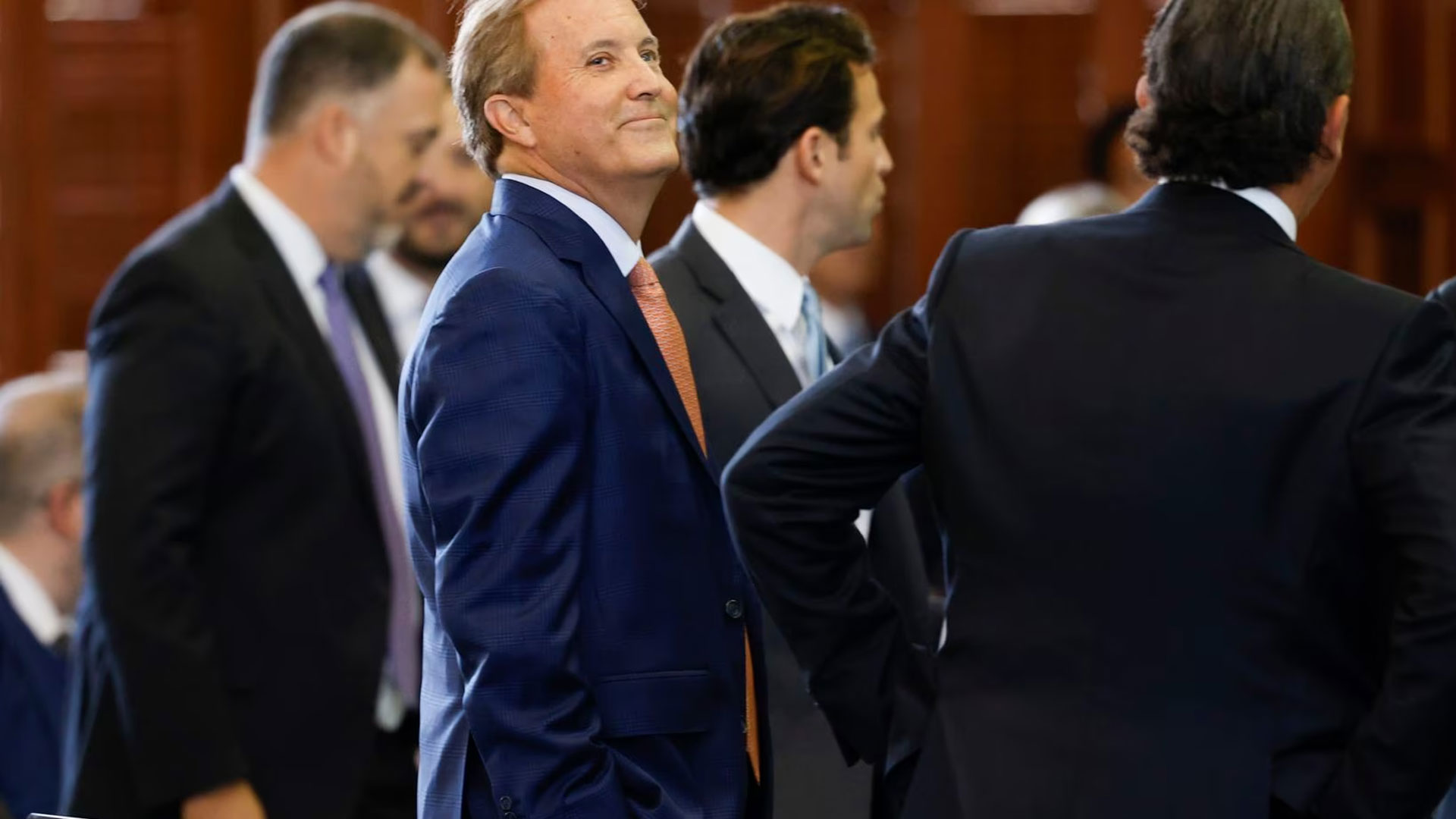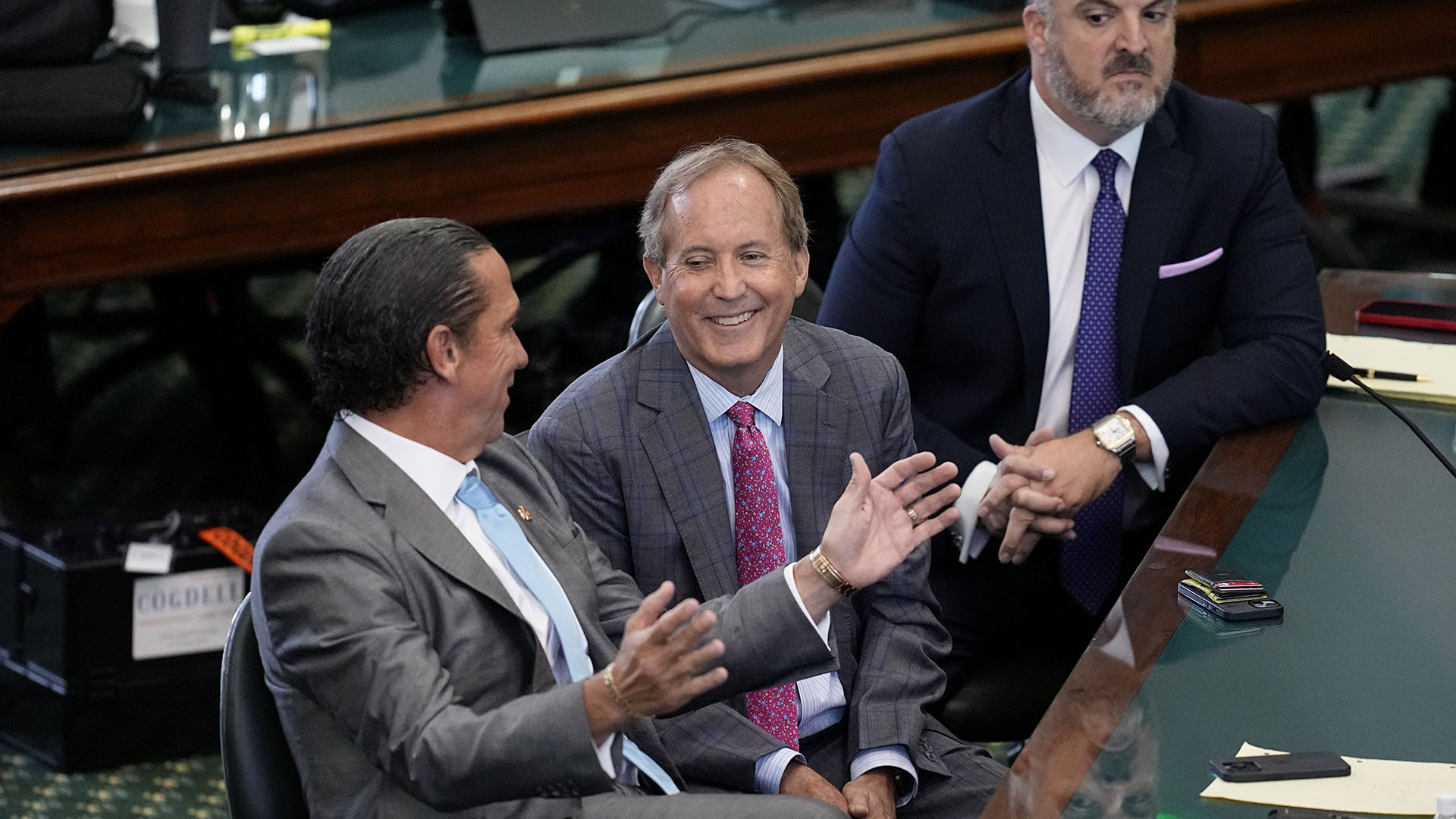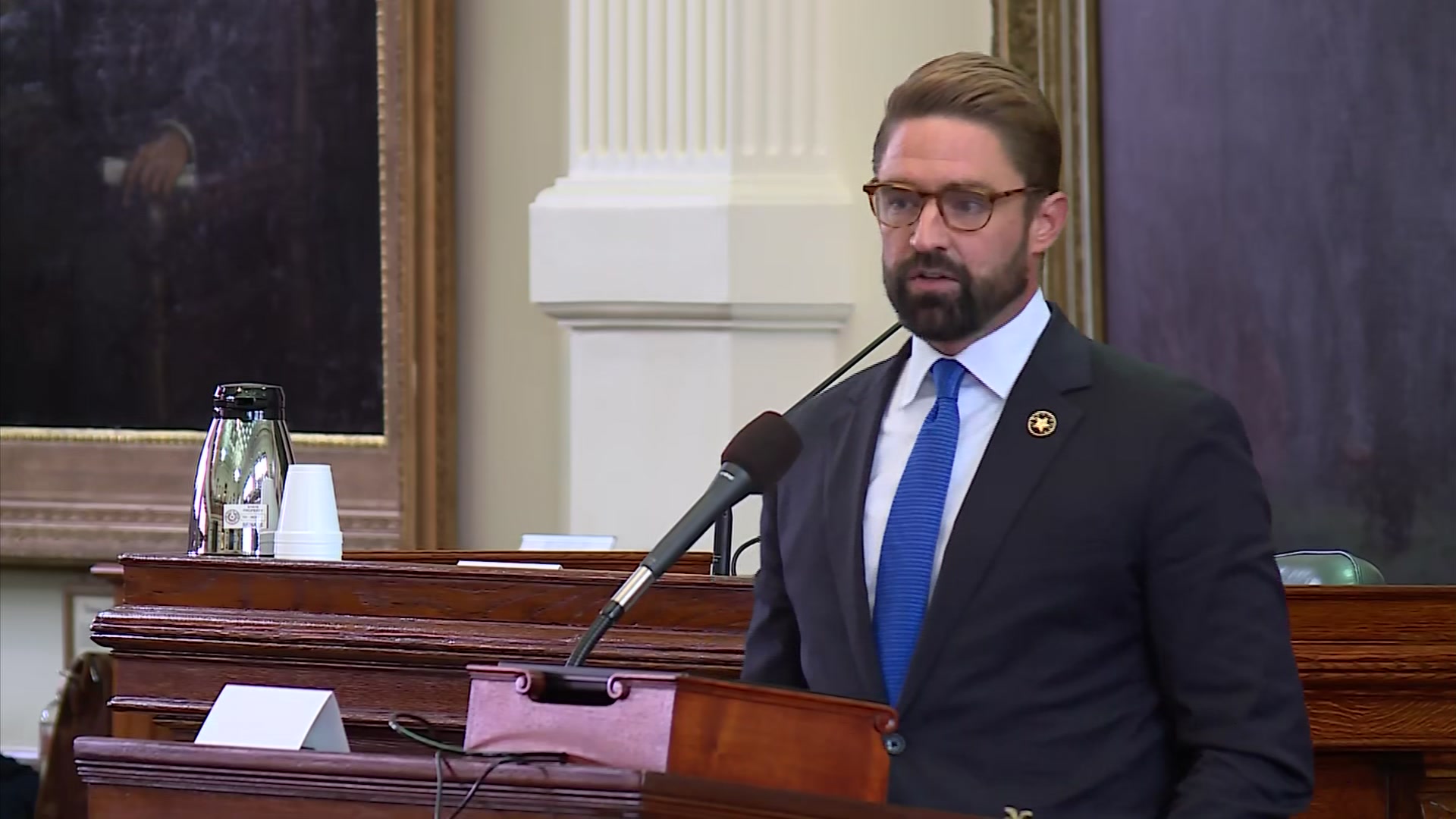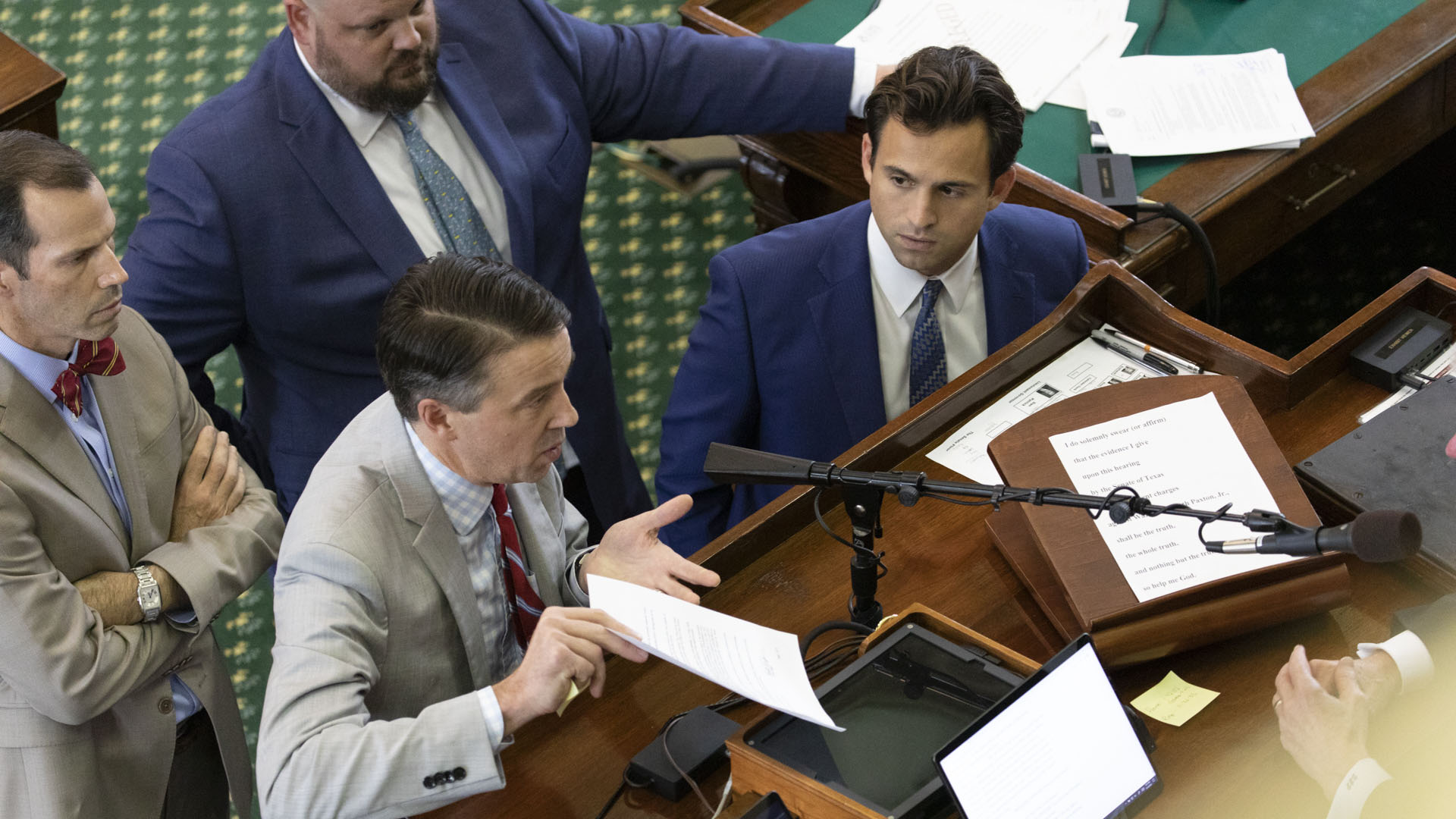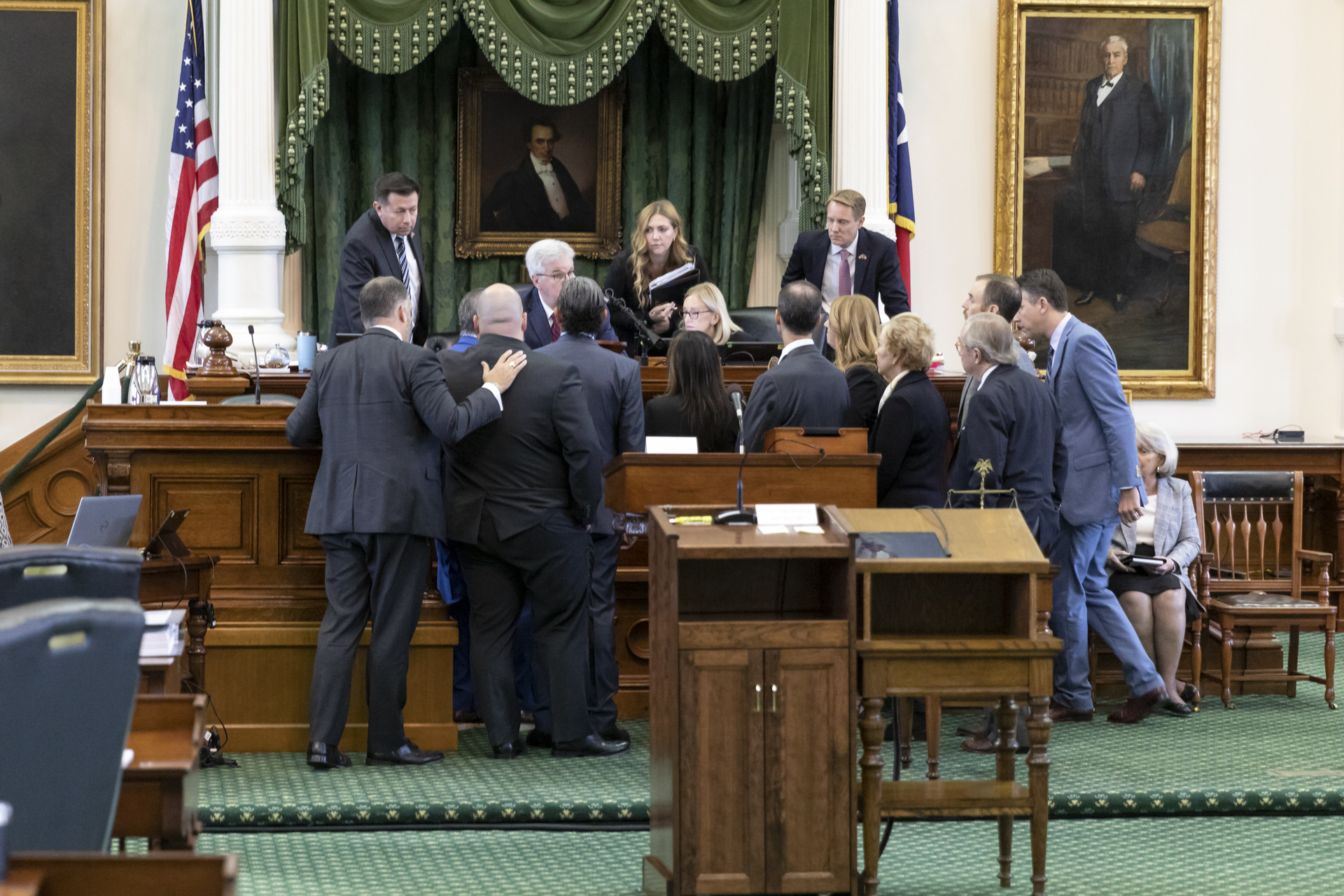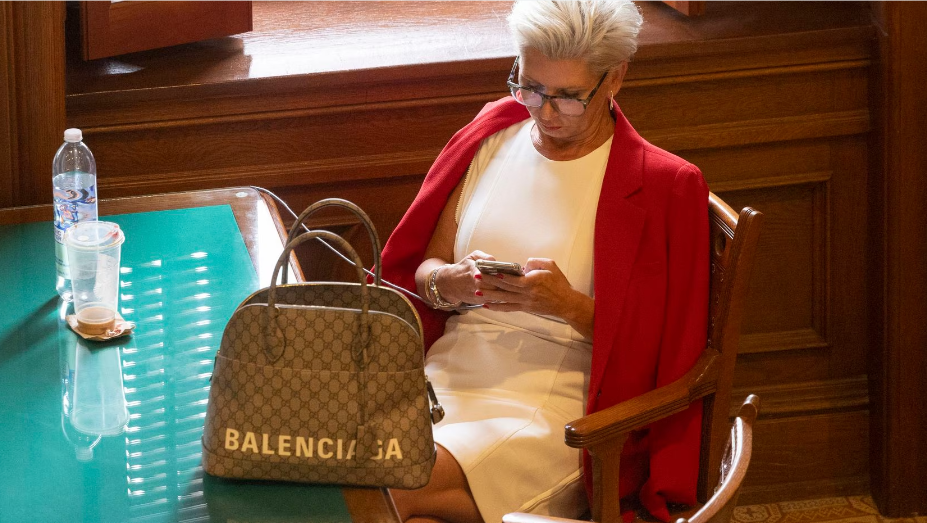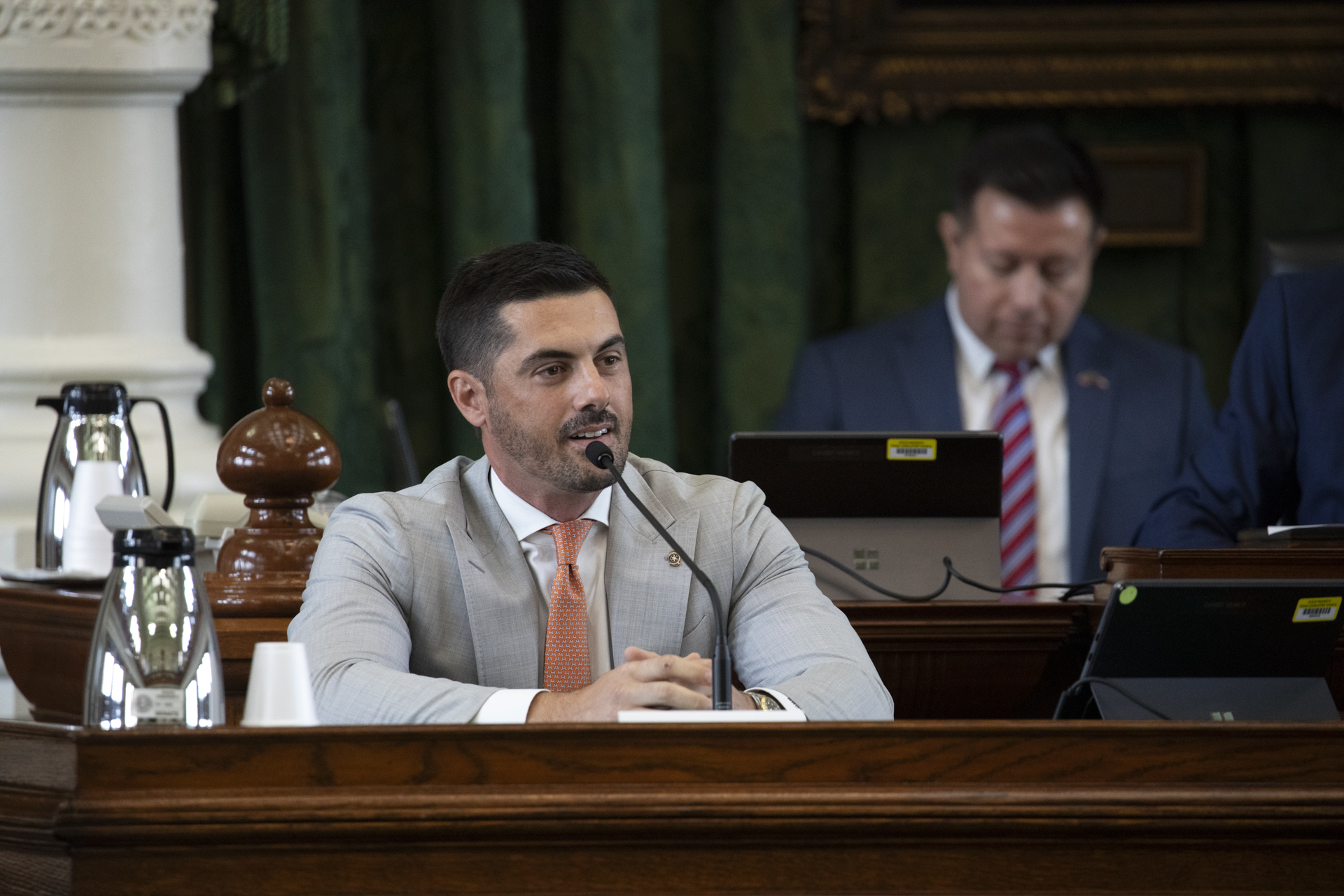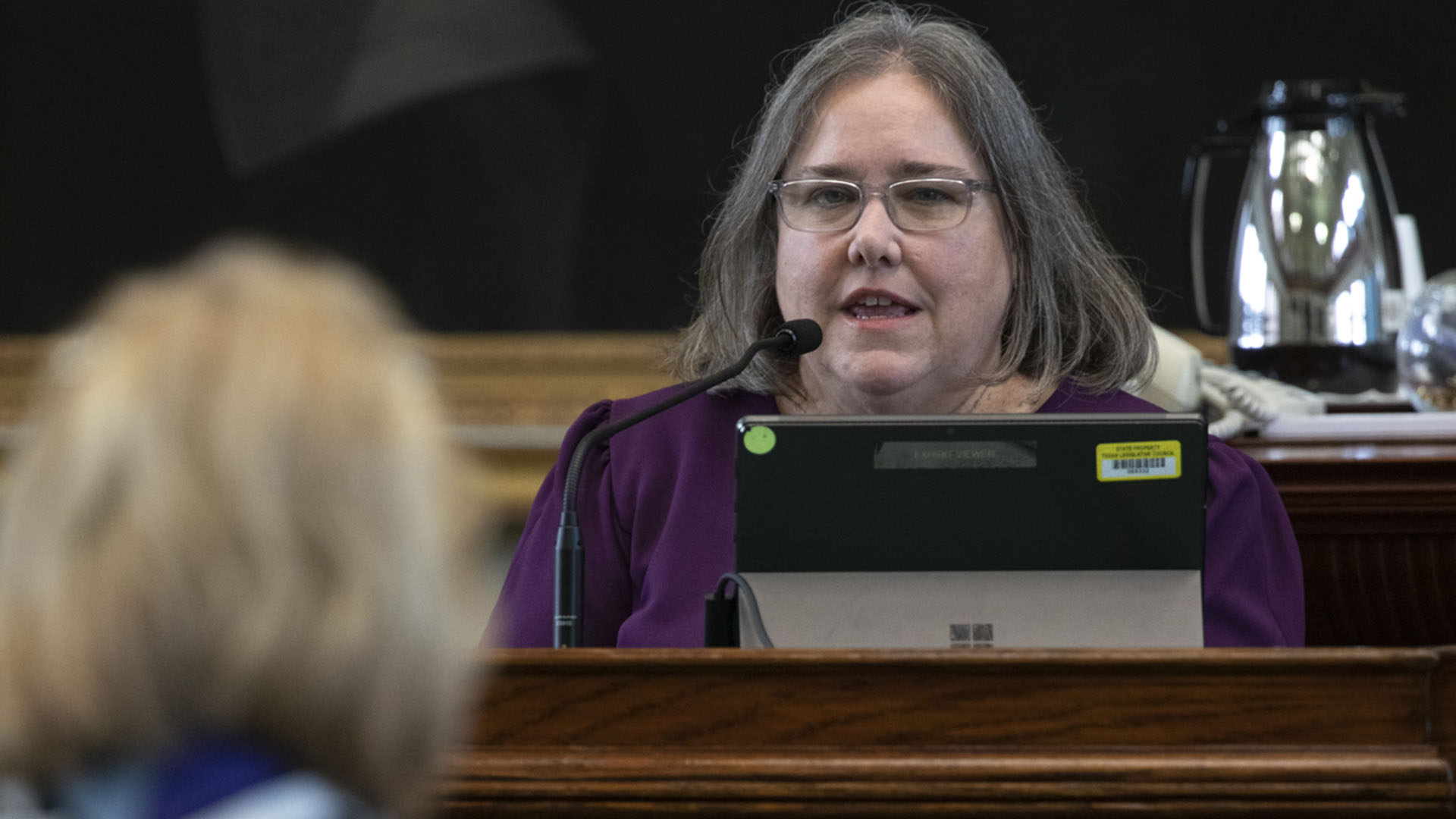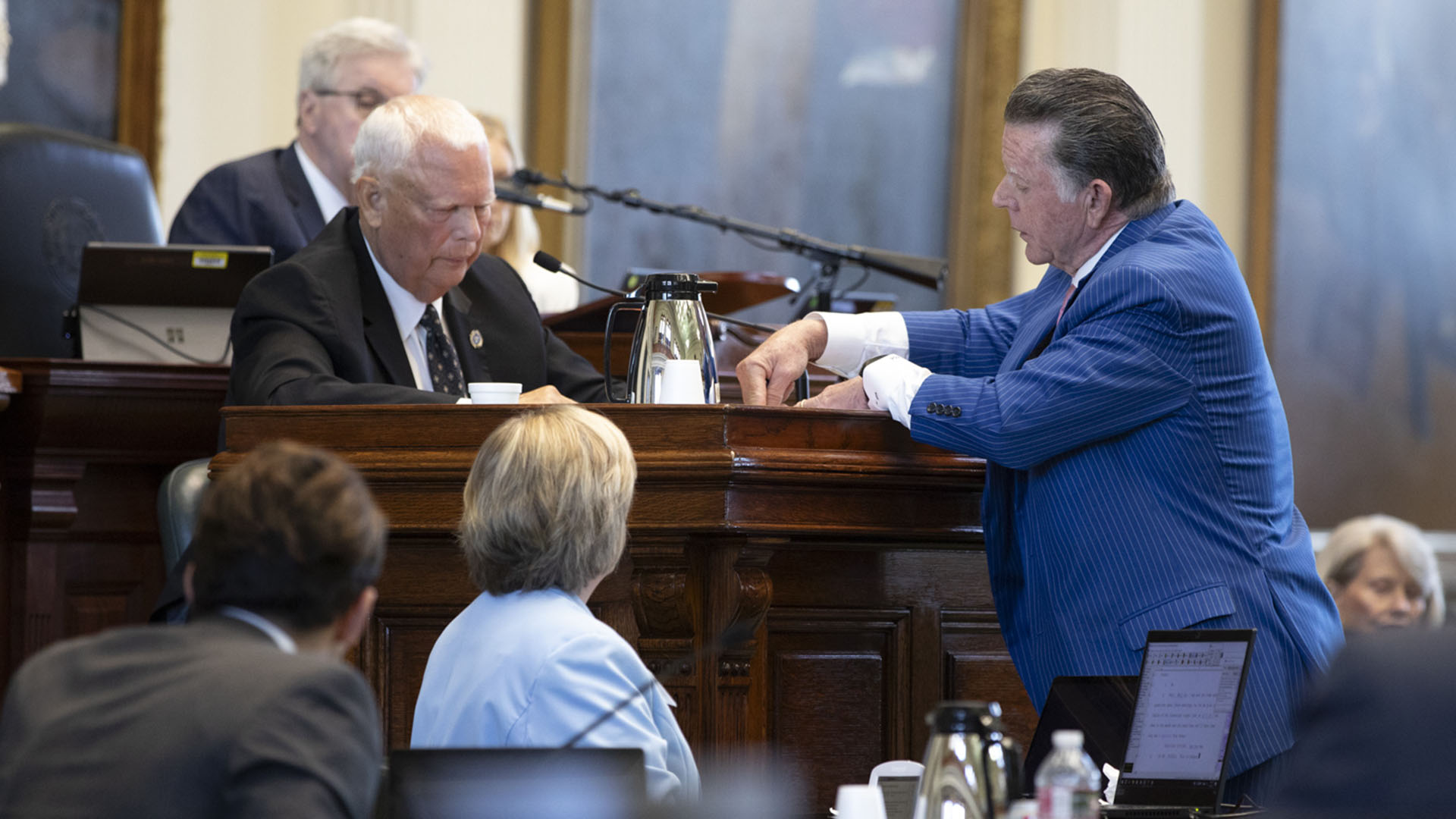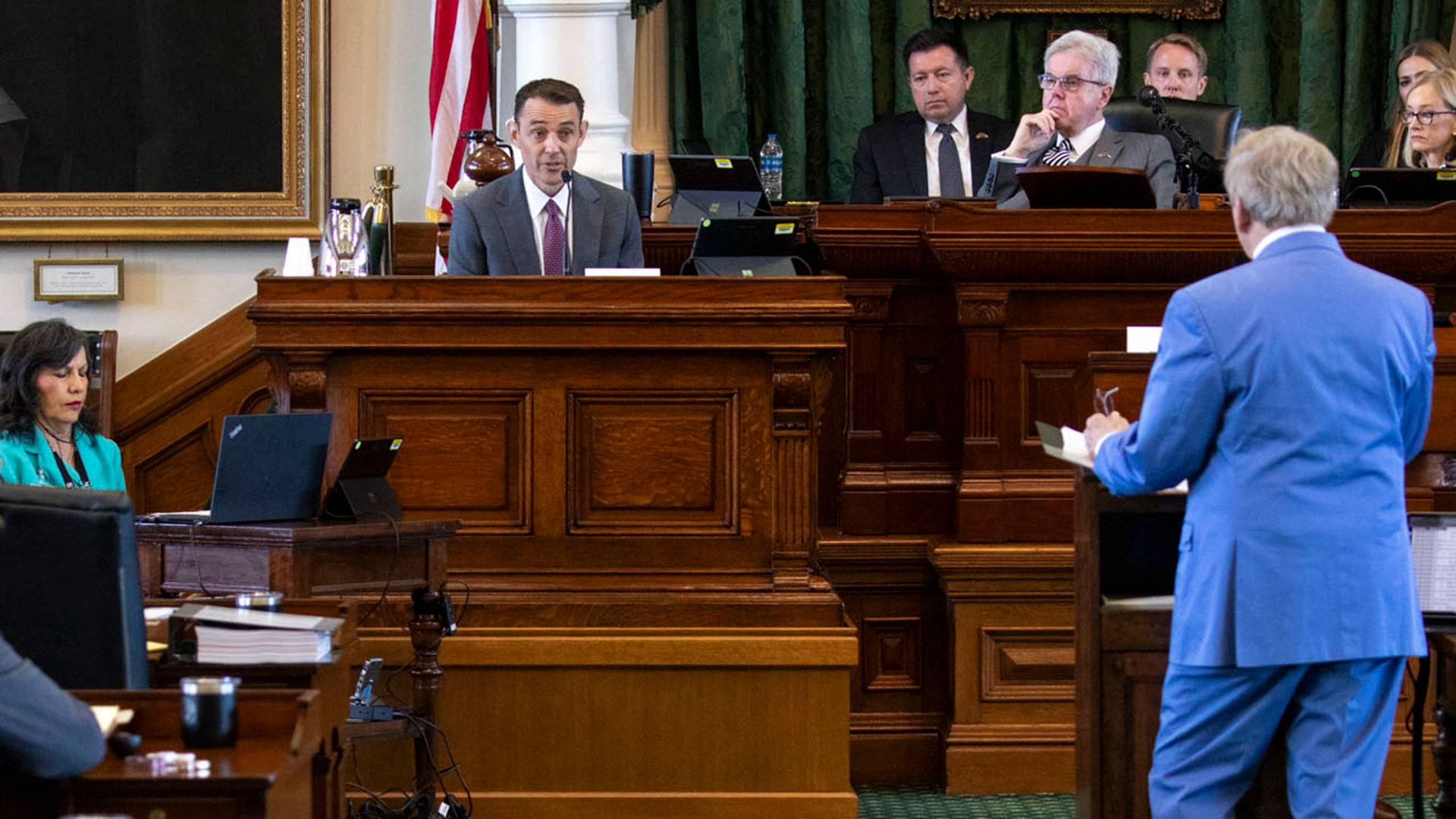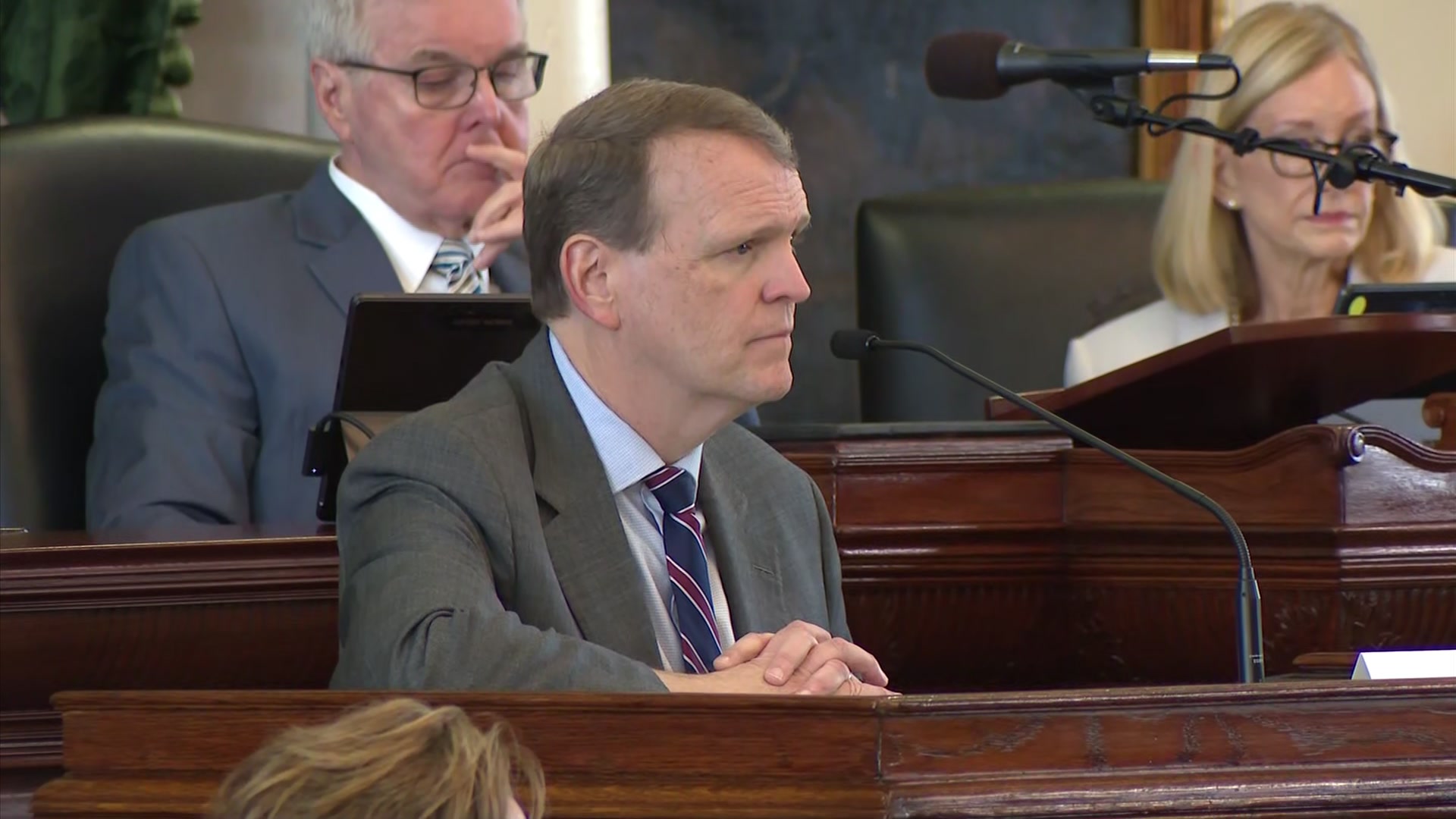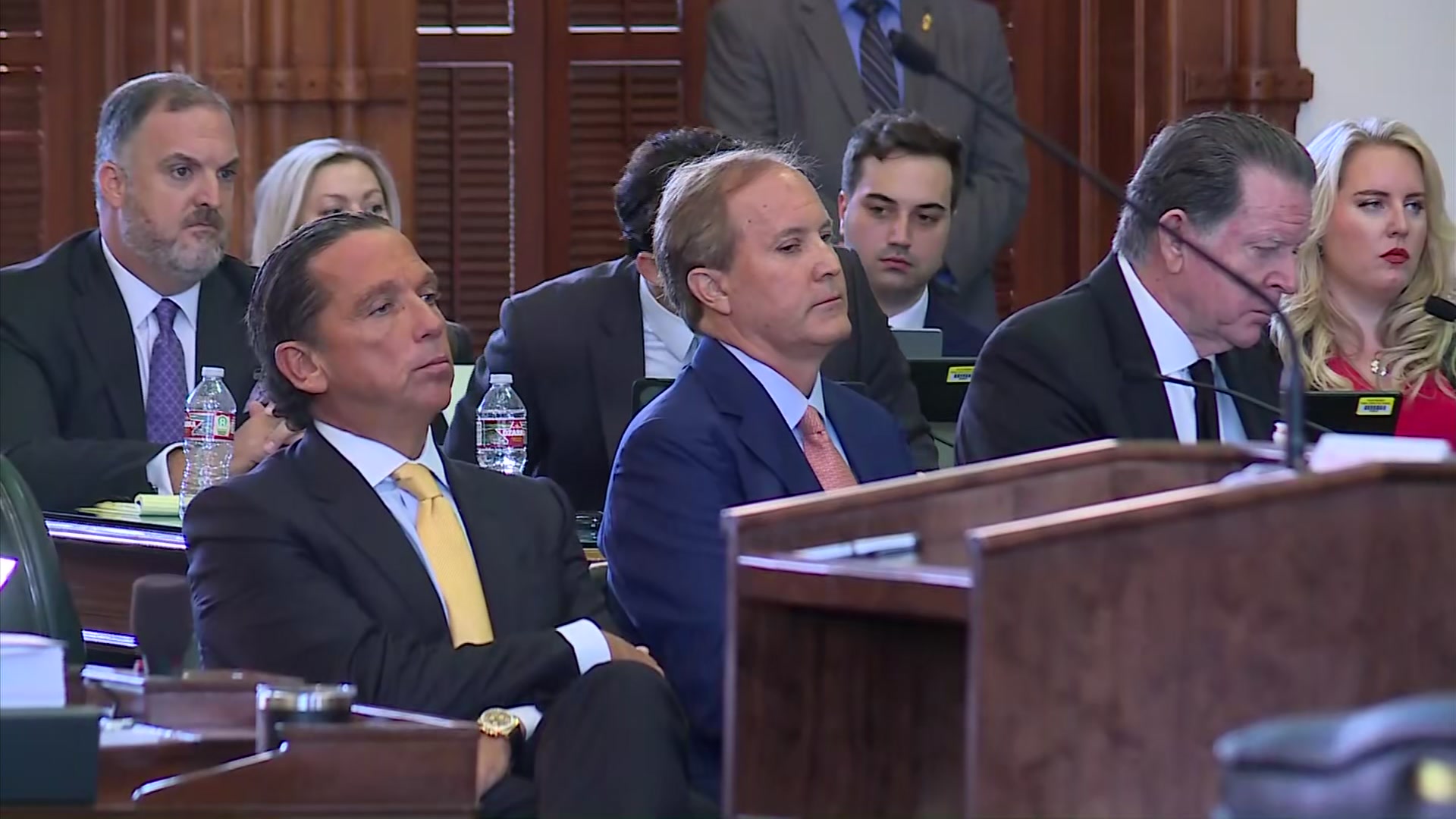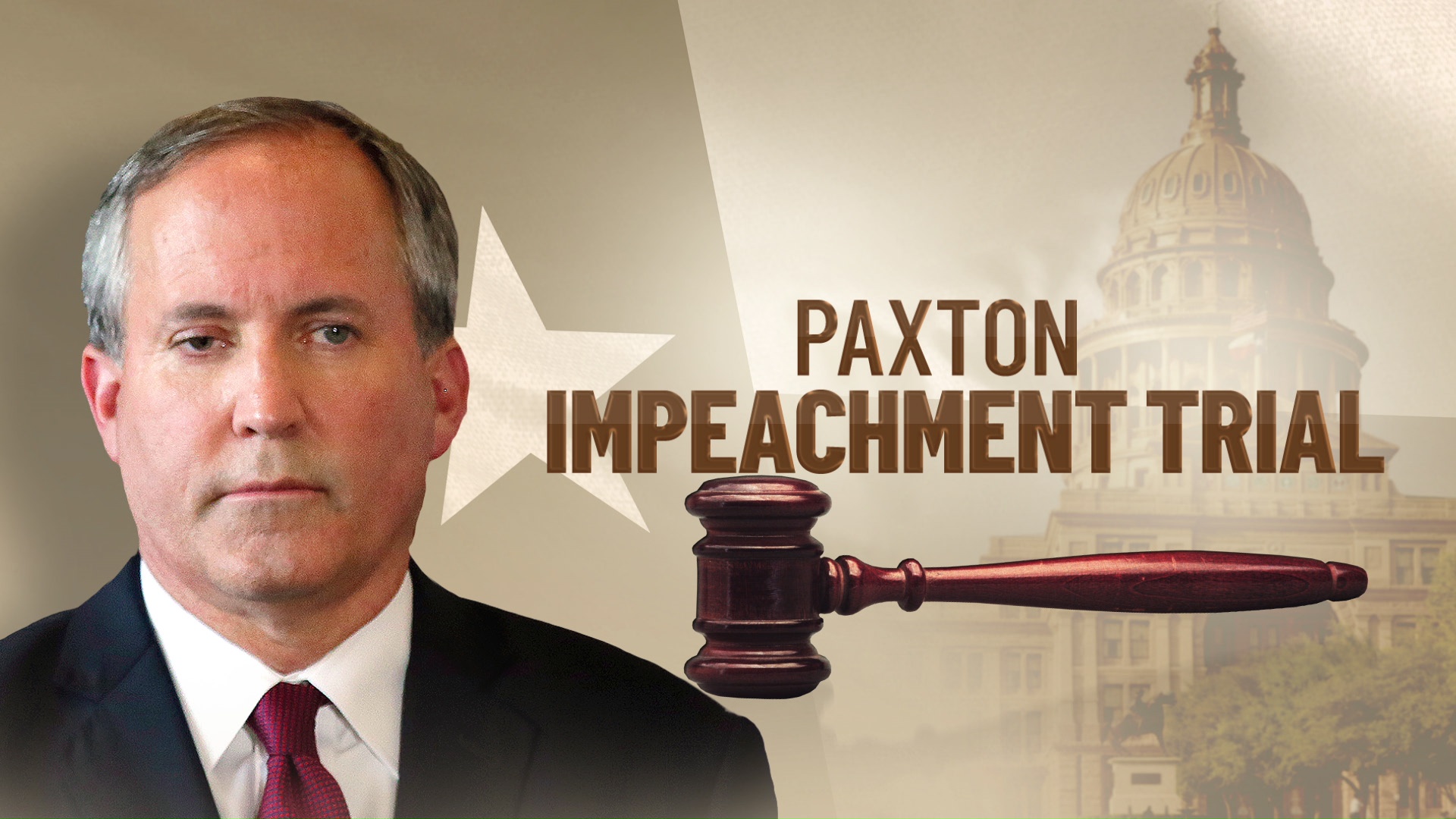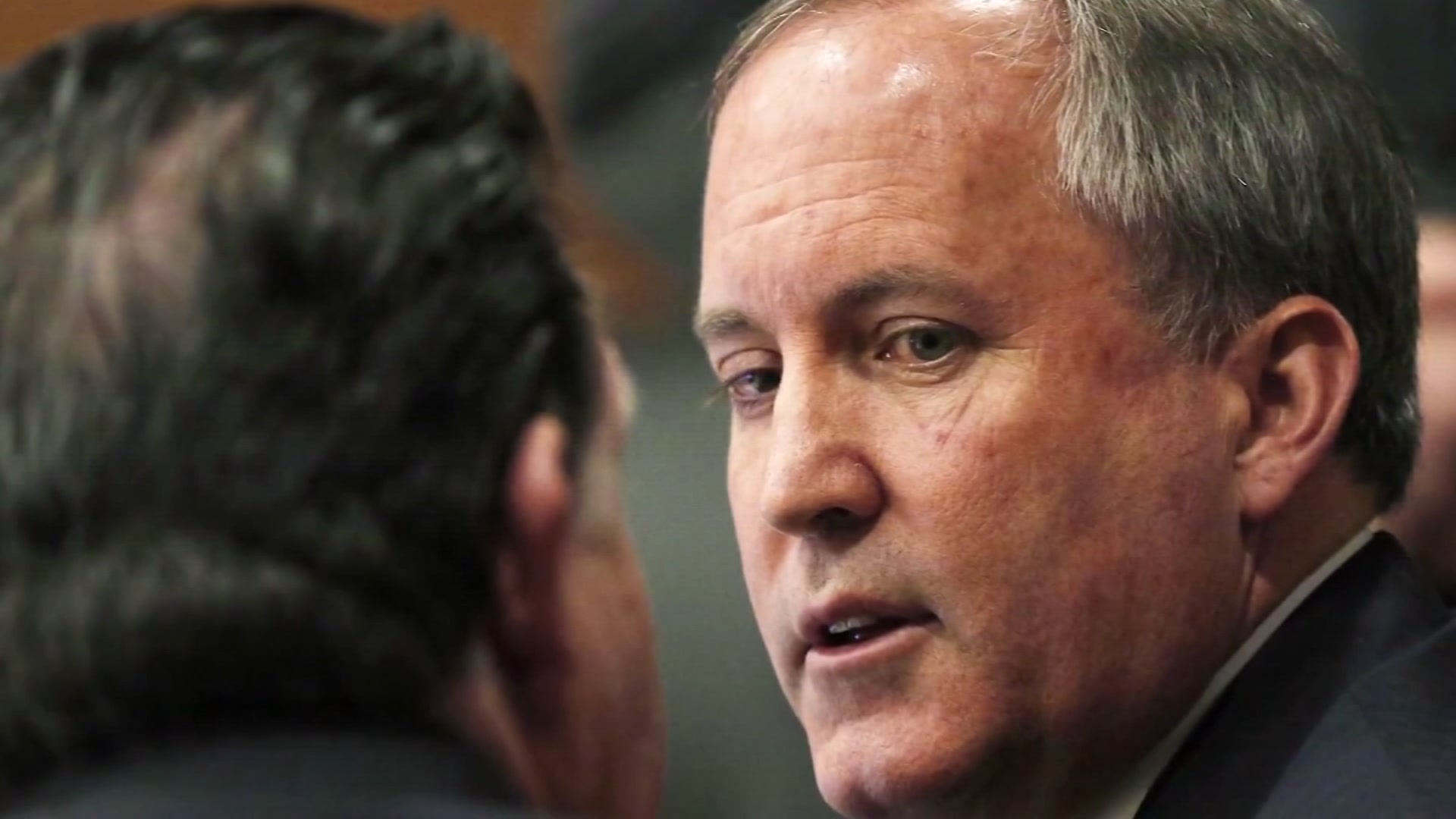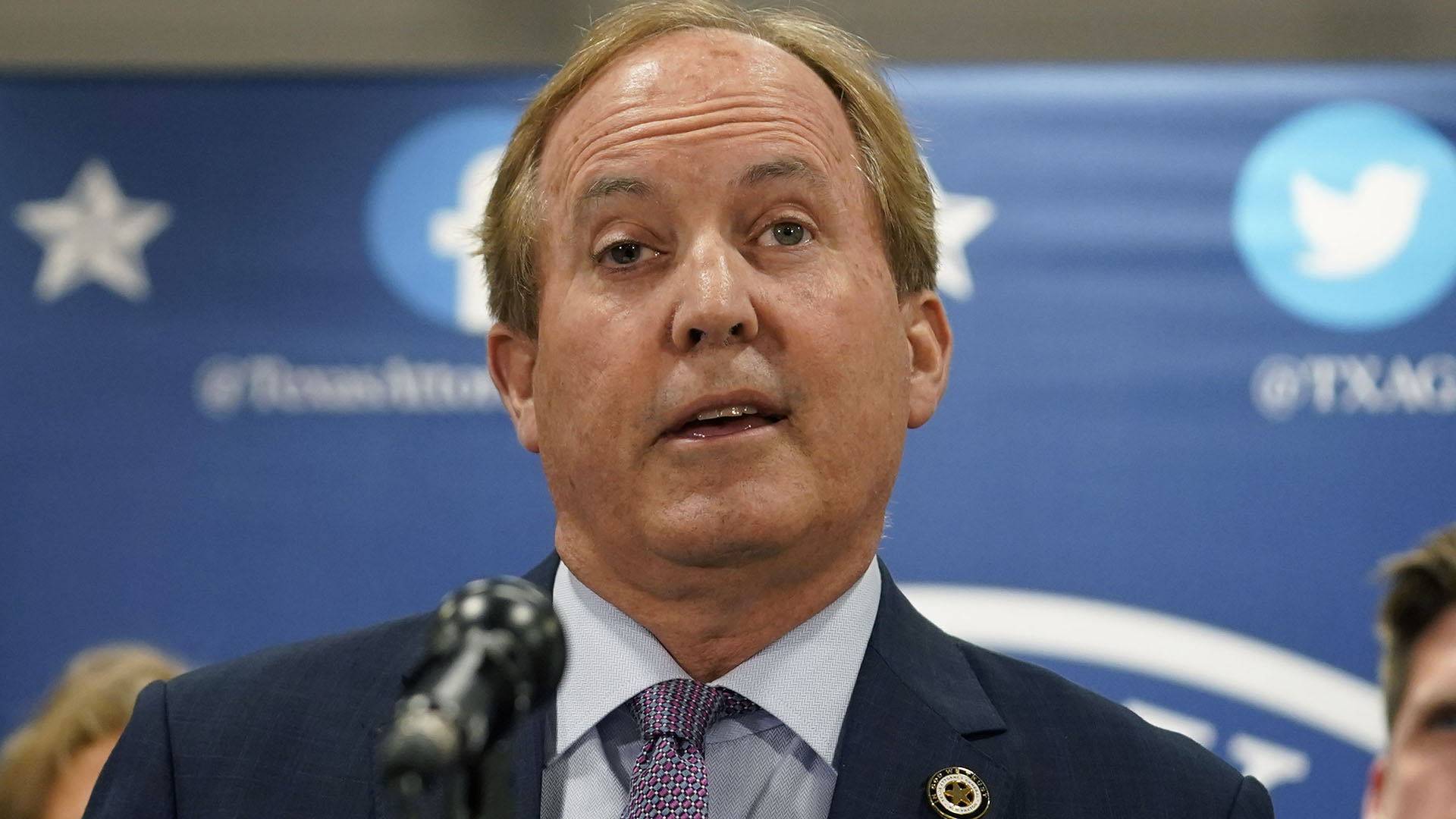The first week of the Ken Paxton impeachment trial ended Friday with testimony from a veteran lawman who said he tried to warn his boss about the issues he is facing now.
David Maxwell served 40 years in the Texas Department of Public Safety, 25 as a Texas Ranger, before becoming head of the attorney general’s criminal division.
Maxwell said he got fired by Paxton for complaining about businessman Nate Paul.
“I told him that Nate Paul was a criminal,” Maxwell said.
Get top local stories in DFW delivered to you every morning. Sign up for NBC DFW's News Headlines newsletter.
Paul claimed that he was a victim of illegal behavior by the Federal Bureau of Investigation with improper warrants served in a search of his home and business.

Maxwell said he met with Paul and his attorney twice under pressure from Paxton.
“My evaluation of the allegations made by Nate Paul is that they were absolutely ludicrous, without merit, no probable cause, not any reason to believe that a crime had been committed,” Maxwell testified.
Evidence shows Paxton hired Houston Attorney Brandon Cammack to pursue an investigation of Paul’s allegation about the FBI and other parties, against the advice of Maxwell and other members of Paxton’s top staff, some of whom testified earlier in the trial.
Whistleblower Ryan Vassar testified that he got fired after going to the FBI with accusations about Paxton.
“I believed that I was a witness to criminal activity that had occurred by General Paxton,” Vassar said.
Paxton's defense lawyers are attacking all the impeachment witnesses. Attorney Mitch Little confronted Vassar.
“Outside counsel contracts don’t have to be approved by you. They don’t have to be approved by Jeff Mateer. They don’t have to be approved by Michelle Price or Lacy Mace or Ryan Bangert or anybody but the guy that got 4.2 million votes,” Little asked.
“That’s right,” Vassar said.
Defense lawyer Dan Cogdell quarreled with Maxwell in a final cross-examination.
“Ranger, are you smart enough to understand my question and are you smart enough to answer my question,” Cogdell said.

Maxwell’s answer was found unresponsive and Cogdell said he was finished.
Ken Paxton was absent from the trial again Friday but his wife Angela Paxton, a state senator was there, though she is forbidden from voting on a decision.
Angela Paxton smiled at people in the Senate gallery, which included Paxton supporters.
The rest of the Texas Senate will decide the case when all of the witnesses are heard.
Texas Lieutenant Governor Dan Patrick, who serves as a judge for this trial, said the case is about half over.
Trial testimony continues at 9 a.m. Monday.
DAY 4 LIVE UPDATES
4:28 p.m., Court is adjourned until Monday at 9 a.m.
4:28 p.m., Cogdell completes recross and the witness is asked to step down.
4:25 p.m., Cogdell began recross. Addressing Maxwell, "Let me get this straight, Ranger, so if the feds break into my house, break the door down, hold my wife at gunpoint, kick my dog, cut off my internet, search my house without a warrant and I want that crime to be investigated, you're telling this jury with a straight face that that's obstructing justice and interfering with a federal investigation? That's your position? Ranger, you're smarter than that."
Maxwell: They did have a search warrant and they did execute it and it was lawful.
Cogdell: You don't know if the search warrant was lawfully issued or not. You don't have a clue, do you?
DeGuerin: Objection …
Maxwell: Mr. Nate Paul doesn't have any evidence that it wasn't lawful.
Patrick: Witness, please.
DeGuerin: Arguing with the witness, objection.
Patrick: Sustained.
Cogdell: Have you ever analyzed the search warrant affidavit to see if it establishes probable cause for each of the search warrants issued?
Maxwell: Mr. Paul did not provide us with the documents.
Cogdell: Objection, non responsive.
Patrick: Sustained.
Cogdell: Ranger, you're smart enough to know what question I'm asking and whether or not to answer it.
DeGuerin: Objection to the sidebar remark.
Cogdell: Ranger, are you smart enough?
Patrick: Sustained.
DeGuerin: Just hold on, there's an objection …
Patrick: Slow down gentlemen. Slow down. I've sustained your objection. Go forward.
Cogdell: Ranger, are you smart enough to understand my question? And, are you smart enough to answer my question?
Maxwell: We analyzed the material he gave us.
Cogdell: Non responsive.
Maxwell: That's all I have.
Patrick: Sustained.
Cogdell: I think we're done here, Ranger. Good luck, sir.
4:25 p.m., Cogdell began recross. Asked Maxwell, "Let me get this straight, Ranger, so if the feds break into my house, break the door down, hold his wife at gunpoint, kick his dog, cut off the internet, search the house without a warrant and he wants that crime to be investigated,
4:25 p.m., DeGuerin passed the witness for recross.
4:23 p.m., DeGuerin revisited the PowerPoint presentation shared by Nate Paul and his attorney. Maxwell said if they had made targets of six people in the presentation they would have committed several federal crimes.
4:23 p.m., Dick DeGuerin began redirect.
4:22 p.m., Cogdell passed the witness for redirect.
4:20 p.m., Cogdell revisited the qualities set forth earlier during cross about what makes a good investigator and then asserted that Maxwell did none of those things when he refused to look into his claims.
4:20 p.m., Maxwell said he did not run Nate Paul through any of their databases.
4:19 p.m., Cogdell asked Maxwell if he ever had any intention of investigating the claims put forth by Nate Paul and he replied, "When I read the allegations I never had any intentions of opening up an investigation, that's correct."

4:17 p.m., Cogdell asked Maxwell if he'd learned anything he provided the House board of managers was untrue or inaccurate and he said "No" and agreed that if he had he would have brought it to their attention.
4:17 p.m., Cogdell asked Maxwell if Ken Paxton took Brandon Cammack before a grand jury and he said he didn't have direct knowledge of that. Asked if he thinks Paxton helped Cammack get subpoenas, he said he didn't know the answer.
4:14 p.m., Cogell resumes questioning Maxwell: "Do you know how your lawyer knew or supposedly knew that it was Paxton that ostensibly took Brandon Cammack to the DA's office?" Maxwell replied, "I do not."
Cogdell: "Do you know how your lawyer learned that Paxton took him to the Travis County grand jury?"
Maxwell: "No, I don't know how he knows that."
Cogdell: "Do you know how your lawyer learned that Paxton was with Cammack when he obtained these grand jury subpoenas?"
Maxwell: "No."
Maxwell said he couldn't verify if the statements were true and added that just because he didn't know if it was true doesn't mean the person who said it didn't know if it was true.
4:12 p.m., Both Cogdell and DeGuerin approach the bench.
4:10 p.m., Cogdell asks Maxwell about statements made by his lawyer that Ken Paxton took Brandon Cammack to the grand jury. DeGuerin objects and the conversation between the attorneys again gets combative.
DeGuerin: Objection, it's law school 101 says you can't ask a client what he told his lawyer.
Cogdell to DeGuerin: I'm not asking him. Law school 101 would also teach you to listen to the question.
Cogdell to Maxwell: Where did your lawyer learn that Paxton took Cammack to the grand jury?
DeGuerin: I have an objection pending as to inquiring about conversations between Mr. Maxwell and his lawyer.
Cogdell to DeGuerin: They're not privileged, they're in front of the House committee.
Patrick: Can both of you come to the bench?
4:03 p.m., Meeting repeating objections, Cogdell tried several times to ask Maxwell if he knew that it was Don Clemmer who suggested referring the case to the attorney general's office. Maxwell said, "No, that's not what he told me."

4 p.m., A lighter moment quickly grew tense as Cogdell asked Maxwell about his history of teaching people how to testify in court.
Cogdell to Maxwell: Why is it every time I ask you if you've taught folks to testify you suddenly can't hear the question?
Maxwell to Cogdell: Actually, my testifying I learned by experience.
Cogdell to Maxwell: And is that one of the things you've learned by experience, Ranger, to pause and act like you haven't heard the question?
Maxwell to Cogdell: (pauses) ... (smacks lips) Maybe.
Cogdell to Maxwell: Fair enough. Well, what did you learn?
Maxwell to Cogdell: I've learned that it throws you off.
Cogdell to Maxwell: Does it? Does it? OK. (Turning angry) And that's your intent, Ranger, rather than testifying to the truth and giving direct answers your game is to throw people off, is that where we're going, Ranger? Is that where we're going?
Maxwell to Cogdell: No.
Cogdell to Maxwell: That's what you just said. That's what you just suggested.
Maxwell to Cogdell: I just said, that I do sometimes pause.
3:55 p.m., Cogdell questions Maxwell about what he told House managers doing the impeachment investigation about Drew Wicker, Ken Paxton's former personal assistant. Cogdell said Maxwell made a statement to investigators about Wicker delivering documents in the dark of night to Nate Paul on the attorney general's behalf. Cogdell said those were unqualified statements. Maxwell added Friday he has no personal knowledge of what Drew Wicker would or would not testify to.
3:50 p.m., Cogdell asks Maxwell if he knows if the attorney general has the authority to hire outside council and he said he didn't know one way or the other and that it wasn't his bailiwick.
3:42 p.m., Cogdell said Nate Paul's attorney said repeatedly in the transcript that he didn't want to obstruct justice or interfere. Maxwell said his actions belied his words.
3:40 p.m., Cogdell asks Maxwell what crime he was asked to commit by being given a PowerPoint presentation. Maxwell replied and said they obviously did not say they wanted a crime to be committed, what they wanted was an investigation. Cogdell questioned if it was illegal for a private citizen to ask for an investigation into whether search warrants were created illegally and he said the investigation was illegal.
Cogdell asked specifically, what crime was committed. Maxwell said in his professional opinion that creating an investigation would be obstruction of justice and interfering with a federal investigation.
3:39 p.m., Court is back in session.
3:26 p.m. Court is in recess.

3:23 p.m., Cogdell asked Maxwell if Nate Paul or his attorney ever asked him to do anything illegal. He said they did when they asked him to interfere in a federal investigation. Maxwell said they are in the documents where he listed six people to be targeted in the investigation.
3:19 p.m., Cogdell and Maxwell discuss the search warrants tied to the Nate Paul raid. Maxwell said there were six, three that were executed and three that were not.
3:03 p.m., Cogdell adds the recorded meetings and transcripts with Nate Paul admitted into evidence.
3:02 p.m., Maxwell said if Nate Paul or his attorney said anything incriminating, he'd pass that information on to the FBI. He agreed that nothing incriminating was ever said during those meetings.
3:01 p.m., Cogdell asks if Ken Paxton put forth any conditions or promises of immunity for Nate Paul during their meetings and discussions, and he said no.
2:59 p.m., Maxwell said the majority of the time he would oversee investigations and sometimes get involved. A referral like the Nate Paul case, would typically have been assigned to a major overseeing special investigations who would then assign it to a team. Maxwell kept the case for himself.
2:58 p.m., Maxwell said he called Don Clemmer, deputy attorney general for criminal justice in the OAG after he got the referral in the mail.
2:56 p.m., Cogdell asserted that Maxwell being asked to investigate the DPS was like Mickey Mantle investigating the Yankees and may not have led to an objective review. Maxwell said he was always professional and looked at things objectively.
2:54 p.m., Maxwell said he felt Nate Paul was a criminal because of all that he saw while reviewing information about him. Cogdell asked if Maxwell went into meetings with Paul with a positive mindset, to which he replied, "No."
2:50 p.m., Cogdell verifies a search warrant could end up in the hands of a defendant and that identifying information that may put witnesses at risk is generally left out of those documents.

2:49 p.m., Court resumes.
2:26 p.m., Patrick calls for a recess to allow Maxwell time to review a document.
2:07 p.m., Cogdell runs through Maxwell's extensive background as a Texas Ranger, prior to his joining the OAG.
2:06 p.m., Dan Cogdell begins cross-examination of David Maxwell.
2:04 p.m., DeGuerin passed the witness for cross-examination.
2:03 p.m., Maxwell said the F5 form filled out when he was terminated noted he was a general discharge, which he protested. Eventually, partly as a result of a lawsuit, the general discharge was changed to an honorable discharge.
"It's important to me to show that I had an honorable discharge and that I did nothing wrong by standing up for right," Maxwell said.
2:02 p.m., Maxwell said he was a victim of retaliation. He was 71 when he was fired and was a top-level law enforcement officer. By berating him in the media, Maxwell said Paxton ended his career.

2 p.m., Maxwell said of his Nov. 2 meeting with Webster that the meeting was not recorded and that Webster said he was conducting an investigation. Maxwell said Webster never asked any direct questions and that he left and asked him to return at 1 p.m. At 1 p.m., Webster didn't show up and at about 4:30 p.m. members of human resources showed up and he was terminated.
1:59 p.m., Maxwell said being placed on leave removed his access and responsibilities with the OAG. He said he was suspended for one month and on Nov. 2, 2020, he was fired by Brent Webster, the new first assistant attorney general who replaced Jeff Mateer.
1:57 p.m., As a result of reporting General Paxton, Maxwell felt like he'd be fired from the OAG. On Oct. 2, two days after the report was made to the FBI, Maxwell said he was told via text message that he was placed on investigative leave.
1:54 p.m., Maxwell said he was not aware of the hiring of Brandon Cammack when it happened and that he found out about it later.
1:55 p.m., Maxwell said he was on vacation in Colorado with his family at the end of September when he learned the OAG deputies were planning to meet with the FBI.
"I learned that all the executive deputies, including Jeff Mateer, were going to stand shoulder to shoulder with me and confront General Paxton with what he has been doing to the agency for the benefit of Nate Paul," Maxwell said.
Maxwell said he was not present to sign the letter signed by the whistleblowers and he said he'd contact Lt. Col. Randy Prince, with the Texas DPS, and tell him what was going on and that they were going to request an investigation.
1:51 p.m., Maxwell said Paxton was upset with him for not buying into Nate Paul's conspiracy theory.
1:51 p.m., Maxwell said he didn't involve any of his subordinates in the review because he was concerned it was going to get him fired and he didn't want to jeopardize their careers by involving them.
1:50 p.m., Speaking of Ken Paxton, "I know his state of mind because in the meeting he threatened to fire me. So I knew then what his commitment was to Nate Paul and he was not going to be deterred from continuing to try and do things that benefit Nate Paul," Maxwell said.
1:47 p.m. When asked why such an untrue statement was improper, Maxwell said, "It was improper because Nate Paul was a criminal and General Paxton was using the office to his benefit."
1:46 p.m., Maxwell said Ken Paxton took Nate Paul's side in that dispute.

1:45 p.m., Maxwell said Nate Paul made public statements during an interview with a business journal where he said the OAG was investigating the FBI and the handling of the search warrants on his property and Maxwell said that was false and they had not done an investigation, that they were not going to do an investigation and that their meetings were confidential. He said Nate Paul was angry at his response and said he had a First Amendment right. Maxwell said he told Paul, "All you're doing is using the power and the prestige of this office for your own purpose and I'm not going to allow that."
1:44 p.m., According to Maxwell, Paxton was supporting Nate Paul's opinion that the OAG needed to do an investigation. Maxwell said Paxton was adamant about it and that Nate Paul became heated.
1:43 p.m., Maxwell said he attended the meeting along with Mark Penley, Nate Paul, his attorney, General Paxton and two of Maxwell's two forensics experts. Maxwell said the forensics experts explained to Paul that the metadata that was changed could have been changed by the fact that the documents had been electronically redacted and encrypted.
1:42 p.m., Maxwell said Ken Paxton wanted to have a third meeting to tell Nate Paul they would not be doing an investigation based on their forensic analysis. That meeting was not recorded and he said Paxton specifically told them he did not want that meeting recorded.
1:40 p.m., Maxwell said a third meeting was held with Nate Paul on Aug. 12.
1:39 p.m., Maxwell said they weren't going to do the investigation requested by Nate Paul because it had no merit. Maxwell admitted he still submitted Paul's documents to his experts within the OAG.
1:29 p.m., Maxwell said there was a second meeting with Nate Paul after Paxton told Mark Penley that he wanted him to conduct another meeting. Penley, who was the executive deputy over criminal prosecution, was involved in that meeting.
1:26 p.m., Maxwell said what was presented by Paul didn't meet his criteria for opening an investigation.
1:25 p.m. Maxwell said he was concerned that if he started an investigation based on Paul's claims they would be interfering with a federal investigation and that they could be charged with obstruction of justice, "based on a complaint that has absolutely no merit."

1:24 p.m., Maxwell said during the meeting Nate Paul laid out his conspiracy theory about what happened the day the search warrants were executed. He complained about the procedures the FBI took to secure the scene and conduct the searches. He said Paul said they came to search for drugs and guns, not records, and that in the middle of the search when they didn't find guns or drugs they edited the warrant to search for records. According to Paul's complaint a US federal magistrate was involved in the conspiracy. Maxwell said he thought that was ludicrous.
1:23 p.m., Maxwell said he selected that room so the meeting could be recorded. Maxwell said a claim that Paxton wanted that meeting recorded was false.
1:22 p.m., Maxwell said he would consent and let Nate Paul tell his story and if he made any statements against his interest he'd report it to the FBI. He said that the meeting took place with Nate Paul and his lawyer on July 21, 2020, on the first floor of the Clements Building in a security office conference room.
1:21 p.m., Maxwell said he did not want to meet with Nate Paul and expressed that to Mateer who said he was getting a lot of pressure from the attorney general for Maxwell to hold the meeting.
1:13 p.m., Maxwell said he'd also hear from an employee of the Travis County District Attorney's Office about Nate Paul. He said he then began researching Nate Paul and learned he was being investigated by the FBI.
"My opinion, that Nate Paul was a criminal and we should not be associated with Nate Paul," Maxwell said.

1:12 p.m., Maxwell said he was asked by Jeff Mateer to meet with Nate Paul at the request of Attorney General Ken Paxton and that "he'll have a story to tell."
1:09 p.m., Maxwell said he reviewed all requests for investigations into public officials. He said there were a lot of requests and only a few were approved each year. He said he had to have a sworn, signed statement from the person making the allegation and the district attorney saying they would prosecute those cases if a case was filed.
1:08 p.m., Maxwell said he had about 350 employees, 205 were commissioned officers and 19 attorneys.
1:05 p.m. Prosecutor Dick DeGuerin began questioning David Maxwell, a former Texas Ranger who served as Paxton's director of law enforcement.
1:03 p.m. Court resumed.
12:03 p.m. Court is in recess for lunch until 1 p.m.
12:00 p.m. Little asked Vassar about a letter regarding foreclosure sales from Stephen Benesh, the State Bar President-elect, in response to Nate Paul's letter. In the letter, Benesh said the he did not agree that the foreclosure is being stopped. Vassar said he had never seen the letter before. Little asked if Nate Paul put his entity in bankruptcy to stop the foreclosure. Vassar said he was not sure.
11:59 a.m. Hardin passed the witness back to Little for recross.
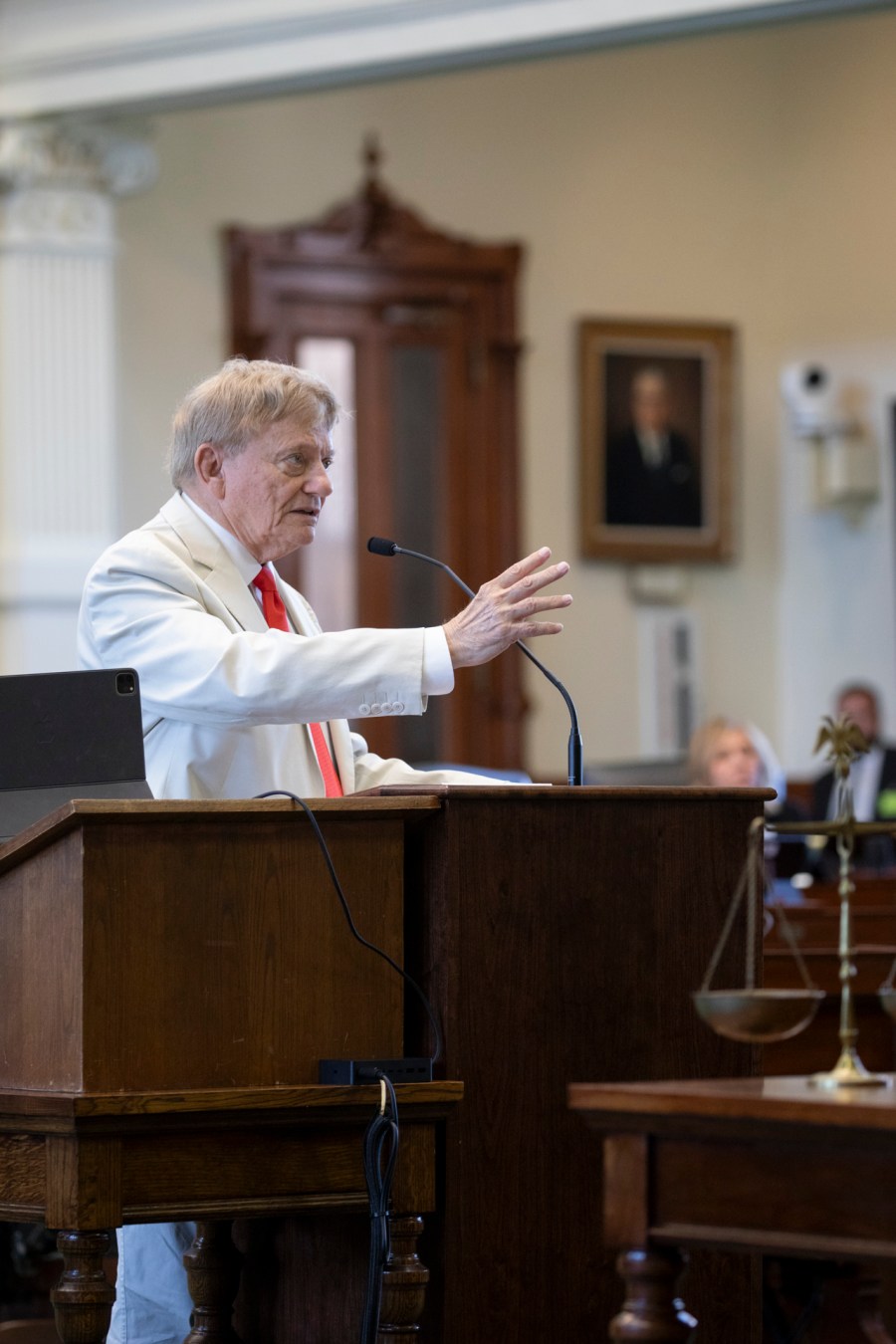
11:57 a.m. "You are indeed, are you not, Mr. Vassar, a kind and gentle person? So much so, that even after enduring yelling and constant interruption, you still don't like to use the word 'lie,' do you?" Hardin asked Vassar. The defense objected, and Hardin said he had no further questions.
11:56 a.m. Hardin asked if any suggestion that Vassar and his fellow whistleblowers had altered the letterhead to remove Paxton's name would be true or not true. Vassar said it would not be true. Hardin: "Would it actually be a lie?" Vassar: "As these documents indicate, there are different seals for different purposes, and in this situation, we used the seal without General Paxton's name on it."
11:55 a.m. Hardin introduced a letter from Jan. 28, 2020, into the record. The letter was signed by Paxton, but it had only the Attorney General's seal and not Paxton's name. Vassar confirmed that the letter is similar to those previously mentioned, which also did not contain Paxton's name on the letterhead.
11:49 a.m. Hardin asked if it was common practice to use two types of paper at the Attorney General's office, one with Paxton's name on the letterhead and one without. Vassar said that was common practice. Hardin asked if the letter without the Attorney General name on the letterhead was the one complaining about Ken Paxton. Vassar said it was.
11:48 a.m. Hardin asked Vassar if he ever saw himself as an investigator in the matter involving Paxton. Vassar said did not, and that he saw himself as a witness.
11:46 a.m. Hardin asked if Vassar was aware that his knowledge of the events with Paxton and Paul counted as evidence in the FBI interview. After multiple objections from the defense, Vassar said he was aware that his knowledge of the experience at the Attorney General's office was evidence.
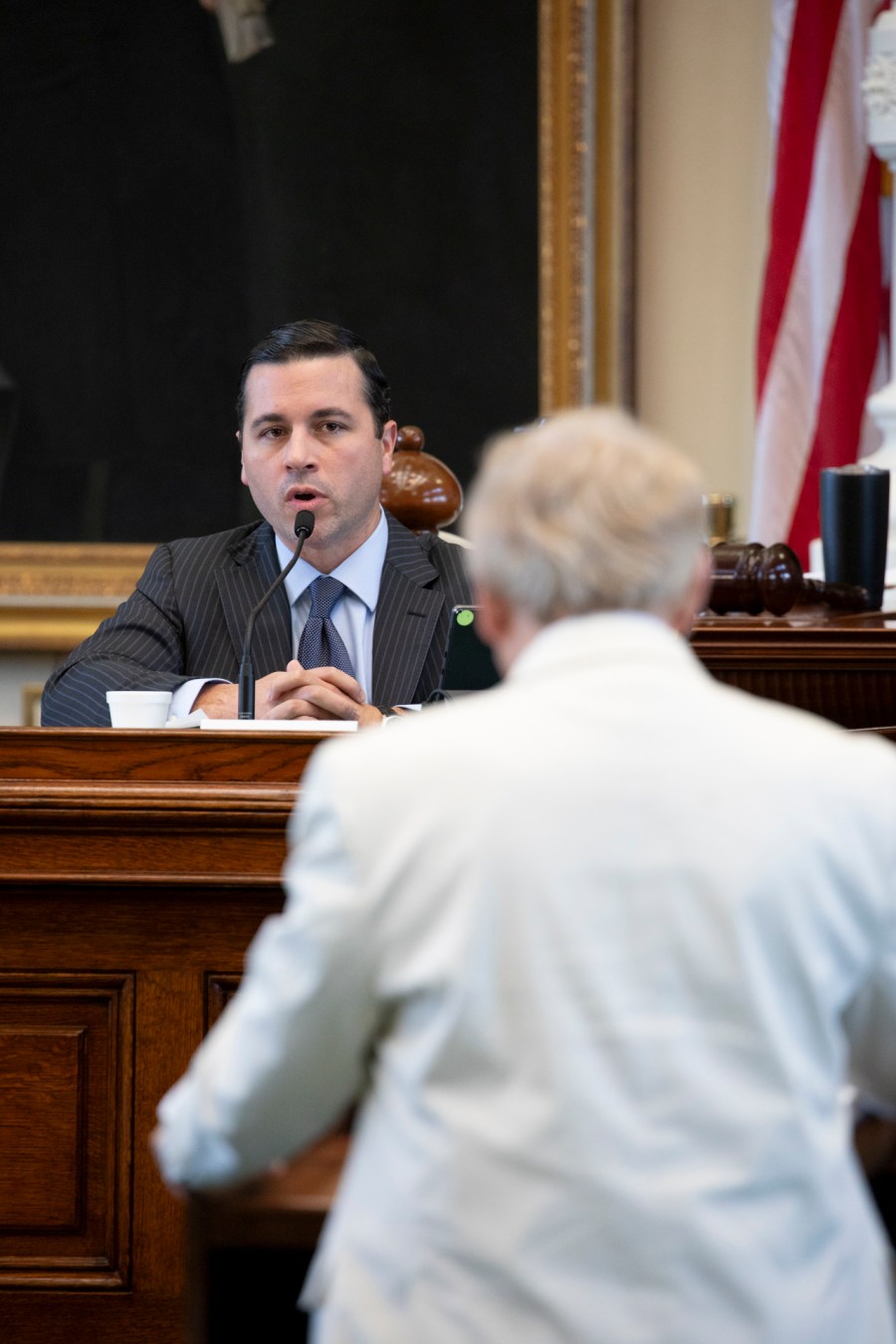
11:45 a.m. Hardin asked if any documents they brought would have been property of the Attorney General's office. Vassar said they would have been.
11:44 a.m. Hardin asked if Vassar and the whistleblowers took any documents with them to the FBI interview. "We took ourselves," Vassar said, meaning that they did not bring any documentary evidence. "[We took ourselves] to provide an explanation of the sequences of events that we had determined revealed information tending to show that General Paxton had abused his office and the power and responsibility and trust that millions of Texans bestowed upon him to benefit one individual," Vassar said.
11:43 a.m. Hardin asked if Vassar testified differently in court on Thursday and Friday than he did when he was interviewed by the FBI. Vassar said he did not.
11:42 a.m. Hardin asked if Vassar was placed under oath when he went to the FBI. Vassar said he was not. Hardin asked if the FBI interview was available to the defense. Vassar said it was.
11:40 a.m. Vassar said one of the exhibits he reviewed, the foreclosure opinion, was used to issue a foreclosure for Nate Paul. Hardin asked how someone would know to use that foreclosure opinion when it was only issued a matter of days before. The defense objected to the question.
11:36 a.m. Hardin asked about the difference between opinions published in six months and those published overnight. He asked about the difference in how the opinions are vetted and how they are "published to the world." Vassar said the six-month opinions are more widely distributed and easily accessible to the public.
11:35 a.m. Hardin asked which sections of the government code were at issue in this trial. Vassar said they were Section 402 and Section 418. Section 402 deals with formal and informal opinions, and Section 418 deals with making disaster declarations.
11:34 a.m. Little passed the witness back to the prosecution for redirect.
11:32 a.m. Little showed a formal opinion from the same period of time to the court. Vassar confirmed that it was a formal opinion because it had a KP number. Little asked if COVID-19 opinions were coming out of the Attorney General's office every day during that period. Vassar said they were.
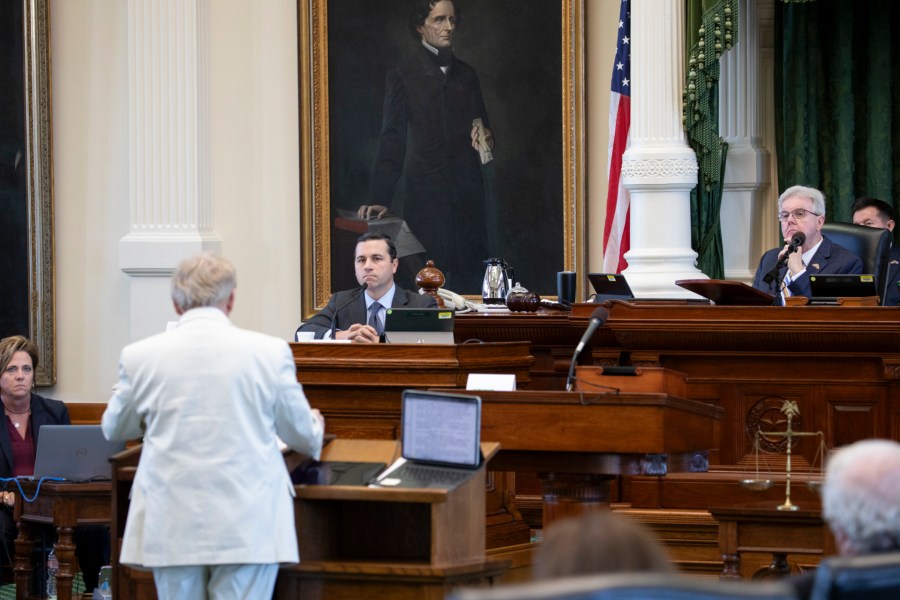
11:28 a.m. Little asked for a letter about moving local elections to be shown to the court. The letter is from the COVID-19 era and did not have a KP number, thus making it an informal legal opinion under Section 402. Vassar confirmed that was true.
11:25 a.m. A letter issued under Section 418 of the Texas Government Code is shown to the court. The letter related to schools during the COVID-19 pandemic. Little asked if the Attorney General's office was working on such letters "constantly." "It was a perpetual thing," Vassar said.
11:24 a.m. Little referenced the foreclosure opinion, which had been previously called the "midnight opinion." Little asked if Vassar was aware that the opinion was not the only one of its kind that was sent out that day. Vassar said he was not aware.
11:23 a.m. Little asked if Vassar was aware that similar informal legal opinions about COVID-19 guidance were coming out of the Attorney General's office every day. Vassar said he did not recall.
11:21 a.m. A letter involving private schools during COVID-19 dated July 17, 2020, was shown to the court. Little asked if it was a formal legal opinion. Vassar said it was not under Section 402 of the Texas Government Code.
11:18 a.m. The response to Nate Paul's DPS open records request was shown to the court. "No one at the Attorney General's office tried to stop it from going out, did they?" Little asked about the unredacted brief. Vassar said no one stopped it. Vassar said they had reason to believe that there was information contained in the brief about Ken Paxton and Nate Paul.
11:15 a.m. Little asked why an unredacted FBI brief relating to Nate Paul was released. Vassar said the unredacted brief was released at the direction of Ken Paxton.
11:13 a.m. Little asked why Vassar's advice about participating in federal grant programs changed in 2020. Vassar said it did not.
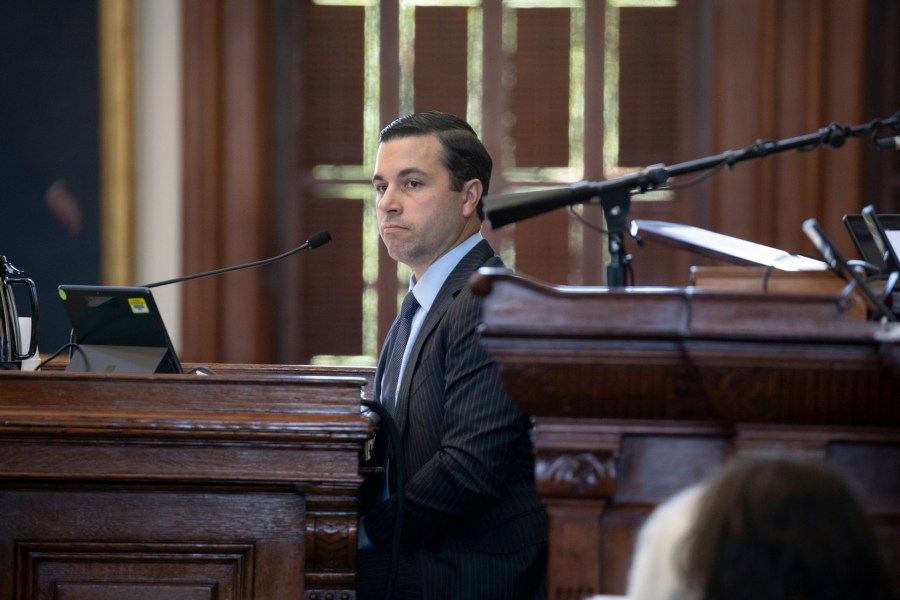
11:09 a.m. Little asked Vassar about why the Office of the Attorney General would need to apply for a federal grant for outside funding. Little asked if it would cost the agency money if it was prohibited from participating in the federal grant program. Vassar said it would.
11:06 a.m. Little asked if the plan was to bring on Cammack as "the third set of eyes." Vassar said that was true. Little asked who the other two sets of eyes would be. Vassar said he did not have anyone specific in mind.
11:02 a.m. Vassar said he did not make the decision to hire Cammack. He said he made a recommendation and provided the legal justification for hiring Cammack.
11:00 a.m. "Jeff Mateer told you to sign this contract, not Ken Paxton?" Little said, referring to the contract to hire Cammack. Vassar said he did. "No one but Jeff Meteer told you to sign this contract?" Little said. Vassar said Jeff Meteer was the only person he spoke to about signing the contract.
10:58 a.m. Little asked if Vassar suggested two candidates to be outside counsel for Paxton, one of whom was Cammack. Vassar said he did.
10:54 a.m. Little asked for the court to be shown Section 402.0212 of the Texas Government Code as it relates to the hiring of outside counsel. Little asked if Paxton came to Vassar for advice about hiring outside counsel. Vassar said he did.
10:53 a.m. Vassar was asked about the number of civil cases that were going on in the Attorney General's office at a given time. He estimated 20,000. Little asked how many of those cases involved Nate Paul. Vassar said he did not know.
10:50 a.m. Little asked if Nate Paul had "such a stranglehold on the office that nothing else was getting done". Vassar said he could not answer yes or no to that question. "You can't say yes, right?" Little said. Hardin objected saying that a witness is not required to simply answer with "yes" or "no."
10:49 a.m. Vassar was asked about the hiring of Brandon Cammack, a special prosecutor with the Texas Attorney General's office hired to investigate the situation involving Nate Paul. Vassar said he was aware that Cammack was hired.
10:46 a.m. Little asked Vassar about a situation he called "the mystery of the missing letterhead." He showed Vassar a draft document with the Attorney General's seal and various signature blocks at the bottom. "Do you notice anything missing?" Little asked. Vassar said he did not. Little said Ken Paxton's name was missing. Vassar said the Attorney General's office has various types of letterheads for documents. Vassar said he was not aware that anyone was instructed to use documents without the Attorney General's name on the letterhead.
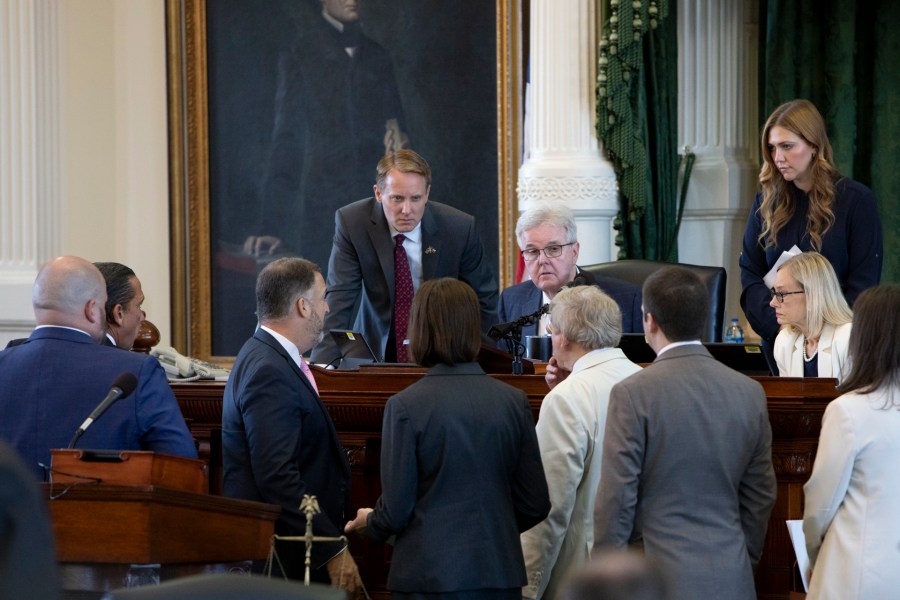
10:43 a.m. Little asked if Vassar was aware that there was a "crisis comms" person working on behalf of the whistleblowers. Vassar said he was not aware of a crisis communications person working on their case.
10:41 a.m. Little read a text from Vassar that included a potential statement that he wanted to make about the whistleblowers and their resignations. He asked Vassar if it was true that no one else on the thread agreed with him. Vassar said that the statement was never made but that he did not think that anyone in the thread disagreed.
10:39 a.m. Little: "Why did Ryan Bangert want to start a media feeding frenzy on Oct. 2?" Vassar: "You would have to ask him that."
10:37 a.m. Little mentioned tweets from Dallas Morning News reporter Lauren McGaughy about the investigation as well as texts between the whistleblowers about McGaughy's coverage. Little asked if Vassar was trying to shape the media's perception of the situation. Vassar said he was not.
10:35 a.m. Vassar said he recalled hiring an employment lawyer. Little asked if Vassar was told he needed to "stick around and make them fire [Vassar]" rather than resign. Vassar did not confirm that he was told to do so.
10:34 a.m. Little asked Vassar if he was aware of a meeting with some of the whistleblowers and Gov. Greg Abbott's Chief of Staff on the day the whistleblowers went to the FBI. Vassar said he did not recall that meeting.
10:32 a.m. Little: "Have you ever heard the expression 'there are no coincidences in Austin'?" Vassar said he did not recall hearing the expression.
10:31 a.m. Little asked if "an experienced attorney" (Sutton) agreed to represent the whistleblowers for free. Vassar said that was not the arrangement.
10:29 a.m. Little asked about how Johnny Sutton was representing the whistleblowers. "Who is paying for that?" Little said. "We are," Vassar said, meaning himself and the other whistleblowers. "Have you paid him?" Little said. Vassar said they have not paid Sutton yet. "Woah," Little said.
10:27 a.m. Little asked about a text Vassar sent that said "We should consider notifying other deputies before Monday." He asked if Vassar was talking about resigning. Vassar said the message was about going to the FBI and notifying others that they had gone to law enforcement before resigning.
10:25 a.m. Little mentioned an image sent by Vassar showing that he had turned on the "silence unknown calls" feature. He asked if Vassar was trying to block media calls. Vassar said he did not recall what he meant.
10:22 a.m. Little asked about another text thread, which he marked Exhibit 1006. Vassar confirmed that he was part of the text thread and that he had seen the texts before, but not as part of the evidence in the trial. Little moved to have the texts added into the record. Little said the text thread was produced by Mark Penley in response to Hardin's subpoena.
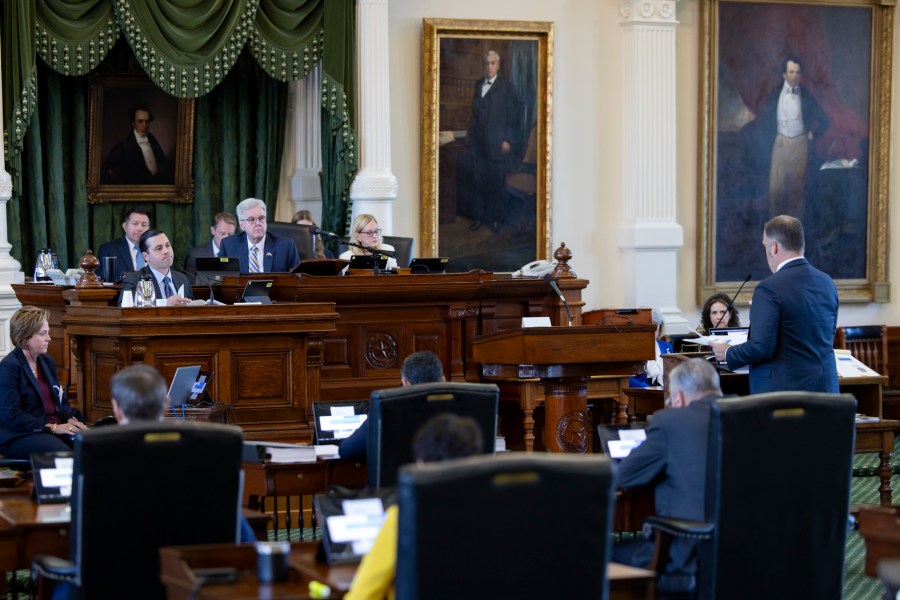
10:19 a.m. Vassar is asked about a meme he sent in the group text that said "Never interrupt your enemy when he is making a mistake." Little asked if Vassar had an enemy at the time. Vassar said "I did not have an enemy. It was a meme." Little asked if Webster was Vassar's enemy. Vassar said he meant that Webster was investigating the wrong person.
10:17 a.m. Little continued questioning Vassar about texts relating to Brent Webster, who was appointed as the First Assistant to the Attorney General in 2020. Webster was investigating the whistleblowers after they went to the FBI.
10:15 a.m. Little asked if the coloring book joke was about "going rogue," referencing the fact that Vassar and the other whistleblowers were called "rogue employees." Vassar said it was.
10:14 a.m. Little mentioned a text thread Vassar was in where he said employees at the Attorney General's office needed a coloring book. Little said the coloring book pictured in the text said: "Going Rouge: The Sarah Palin Rogue Coloring & Activity Book." Little asked if the joke was because Sarah Palin was "so dumb" that she did not know the difference between "rouge" and "rogue." Vassar said that was not the joke.
10:13 a.m. Vassar entered the courtroom.
10:11 a.m. Lt. Gov Dan Patrick entered the courtroom. Court is back in session.
9:29 a.m. Lt. Gov. Dan Patrick called a 30-minute recess.
9:28 a.m. Vassar was asked about his desire to stay employed with the Attorney General's office after going to the FBI. Little: "At this time were you hoping to retain your job?" Vassar: "Yes, sir."
9:26 a.m. Vassar: "We had all been through a lot at that point and I suppose people process things in different ways." Little: "Gallows humor, if you will?" Vassar: "Yes."
9:25 a.m. Little continued his line of questioning about the text messages in the thread with Vassar and fellow whistleblowers. Little: "Are you proud of this?" Vassar: "No."
9:24 a.m. Vassar was asked if he deleted the texts in the group thread about his coworkers because "no one in these impeachment proceedings was supposed to see this." Vassar said he did not.
9:19 a.m. Little continued asking Vassar about the text thread with Vassar's fellow whistleblowers. Little mentioned instances where Vassar said "he is a joke" about a coworker and suggested that employees at the Attorney General's office need to "use smaller words in their pleadings." Little asked if Vassar was "insulting his coworkers." Vassar said he was not.
9:17 a.m. Questioning continued about a group text Vassar was in during October 2020. Little asked Vassar what he meant when he sent "#solesurvivor" in the group text. Vassar said he could have meant that he was the last remaining whistleblower in the office.
9:15 a.m. Little asked Vassar about his knowledge of bankruptcy law. Vassar said he was not a bankruptcy lawyer. Vassar asked about foreclosures as they relate to bankruptcy filings. Vassar again said bankruptcy law was not his area of expertise.
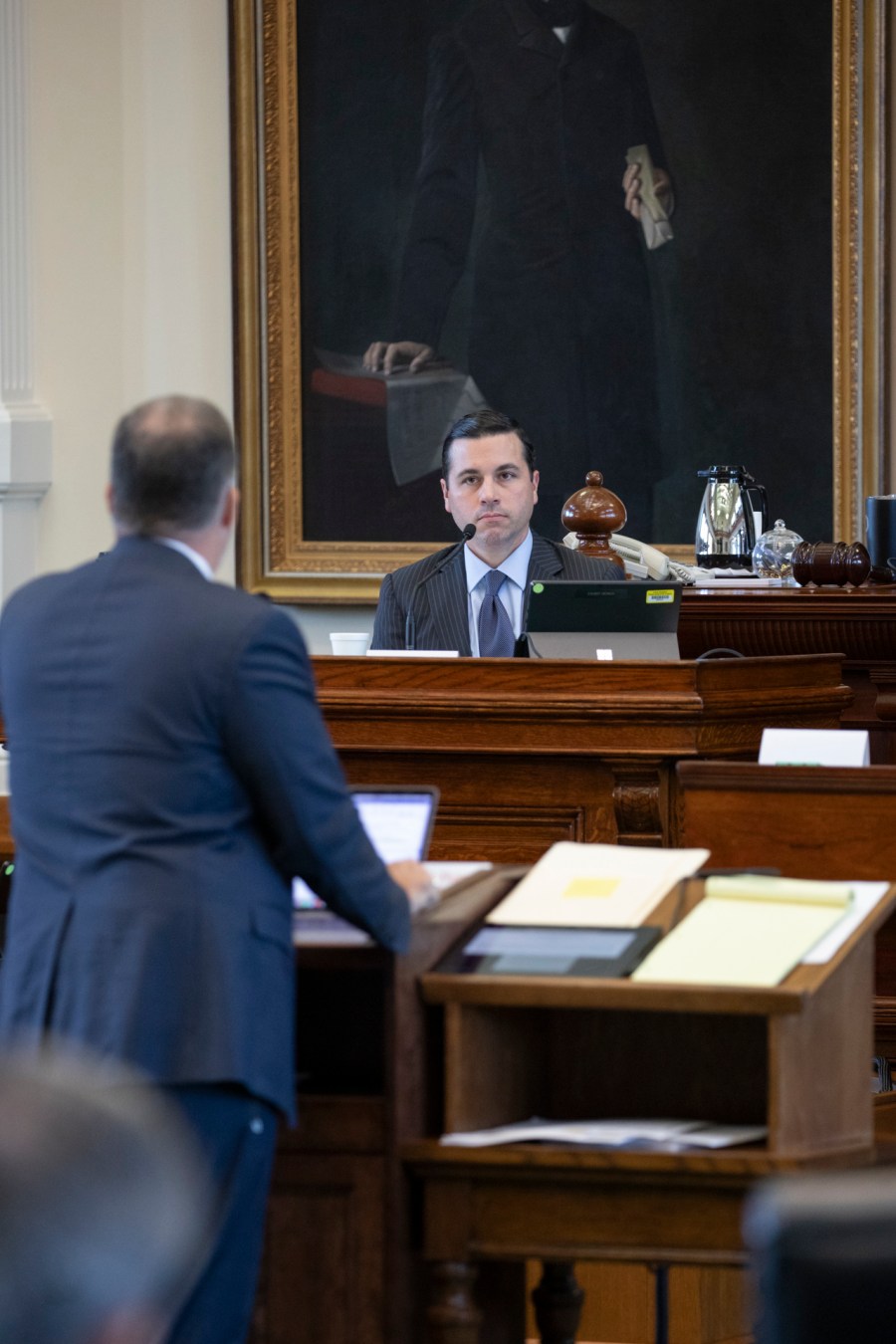
9:13 a.m. Little showed a message from Vassar containing a Batman meme during the time after his employment with the Attorney General's office. He asked if Vassar recalled sending the meme during the aforementioned “somber” time. Vassar said he recalled sending the meme because it bore some resemblance to an acquaintance.
9:10 a.m. Little asked if the period after leaving the Attorney General's office was a "somber" time for Vassar. Vassar said it was.
9:08 a.m. Little continued his questioning about a text thread from Oct. 20, 2020. He mentioned how Vassar had a hard time finding a job after leaving the Attorney General's office. Vassar said he did have a hard time finding another job.
9:06 a.m. Little asked Vassar about a text thread that had been entered into evidence. He asked if Vassar was in possession of the texts, and Vassar said he was not. Little asked Vassar if he deleted those texts. Vassar said he did not, and explained that they were on a different phone.
9:05 a.m. Defense attorney Mitch Little continued his cross-examination of Vassar. Vassar was asked if he recalled being called a "rogue employee" and asked if it was painful for Vassar. Vassar said he did recall being referred to as a "rogue employee," and that it was painful.
9:04 a.m. Ryan Vassar entered the courtroom.
9:02 a.m. Court began with a prayer led by Sen. Kevin Sparks from District 31.
9:01 a.m. Ken Paxton, who is not required to attend all of the proceedings, was not seen in the courtroom Friday morning.
9:00 a.m. The Senate was called to session and Lt. Gov. Dan Patrick entered the chamber. The jury was then called into the chamber.
WHY IS PAXTON ON TRIAL?
The Republican-led Texas House of Representatives voted overwhelmingly in May to impeach the attorney general, largely based on his former deputies' claims that he used his power to help a wealthy donor who reciprocated with favors including hiring a woman with whom Paxton had an extramarital affair. The 20 articles of impeachment brought forth by the Texas House include allegations of abuse of public trust, unfitness for office and bribery. The Texas Senate is holding four of the articles in abeyance because they are largely related to the 2015 criminal charges where Paxton has been accused of felony securities fraud. Paxton has pleaded not guilty in that case but so far there has been no trial.
If convicted in the impeachment, Paxton would be removed as attorney general and could be barred from holding future elected office in the state.
THE LATEST IN THE KEN PAXTON IMPEACHMENT TRIAL
Below are some of the headlines from the historic nine-day impeachment trial.
KEN PAXTON IMPEACHMENT TRIAL
What to know about the historic impeachment of Texas Attorney General Ken Paxton.

